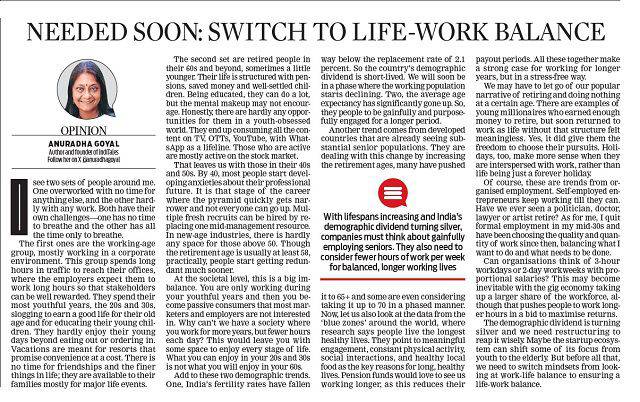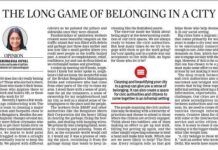I see two sets of people around me. One overworked with no time for anything else, and the other hardly with any work. Both have their own challenges—one has no time to breathe and the other has all the time only to breathe.
The first ones are the working-age group, mostly working in a corporate environment. This group spends long hours in traffic to reach their offices, where the employers expect them to work long hours so that stakeholders can be well rewarded. They spend their most youthful years, the 20s and 30s, slogging to earn a good life for their old age and for educating their young children. They hardly enjoy their young days beyond eating out or ordering in. Vacations are meant for resorts that promise convenience at a cost. There is no time for friendships and the finer things in life; they are available to their families mostly for major life events.

The second set are retired people in their 60s and beyond, sometimes a little younger. Their life is structured with pensions, saved money and well-settled children. Being educated, they can do a lot, but the mental makeup may not encourage. Honestly, there are hardly any opportunities for them in a youth-obsessed world. They end up consuming all the content on TV, OTTs, YouTube, with WhatsApp as a lifeline. Those who are active are mostly active on the stock market.
That leaves us with those in their 40s and 50s. By 40, most people start developing anxieties about their professional future. It is that stage of the career where the pyramid quickly gets narrower and not everyone can go up. Multiple fresh recruits can be hired by replacing one mid-management resource. In new-age industries, there is hardly any space for those above 50. Though the retirement age is usually at least 58, practically, people start getting redundant much sooner.
At the societal level, this is a big imbalance. You are only working during your youthful years and then you become passive consumers that most marketers and employers are not interested in. Why can’t we have a society where you work for more years, but fewer hours each day? This would leave you with some space to enjoy every stage of life. What you can enjoy in your 20s and 30s is not what you will enjoy in your 60s.
Add to these two demographic trends. One, India’s fertility rates have fallen way below the replacement rate of 2.1 percent. So the country’s demographic dividend is short-lived. We will soon be in a phase where the working population starts declining. Two, the average age expectancy has significantly gone up. So, they people to be gainfully and purposefully engaged for a longer period.
Another trend comes from developed countries that are already seeing substantial senior populations. They are dealing with this change by increasing the retirement ages, many have pushed it to 65+ and some are even considering taking it up to 70 in a phased manner. Now, let us also look at the data from the ‘blue zones’ around the world, where research says people live the longest healthy lives. They point to meaningful engagement, constant physical activity, social interactions, and healthy local food as the key reasons for long, healthy lives. Pension funds would love to see us working longer, as this reduces their payout periods. All these together make a strong case for working for longer years, but in a stress-free way.
We may have to let go of our popular narrative of retiring and doing nothing at a certain age. There are examples of young millionaires who earned enough money to retire, but soon returned to work as life without that structure felt meaningless. Yes, it did give them the freedom to choose their pursuits. Holidays, too, make more sense when they are interspersed with work, rather than life being just a forever holiday.
A leading IT services company recently increased its retirement age from 58 to 60 to bring down the overall attrition rate. I see them as being future-wise. Those in their 50s are less likely to switch careers. This would bring the required balance between youthful energy and experience-based wisdom.
Of course, these are trends from organised employment. Self-employed entrepreneurs keep working till they can. Have we ever seen a politician, doctor, lawyer or artist retire? As for me, I quit formal employment in my mid-30s and have been choosing the quality and quantity of work since then, balancing what I want to do and what needs to be done.
Can organisations think of options like 3-hour workdays or 2-day workweeks with proportional salaries? This may become inevitable with the gig economy taking up a larger share of the workforce, although that pushes people to work even longer hours in a bid to maximize returns.
The demographic dividend of India is turning silver and we would need restructuring to reap it wisely. Maybe the startup ecosystem can shift some of its focus from youth to the elderly, and design products and services with them in mind. But before all that, we need to switch mindsets from looking at work-life balance to ensuring life-work balance.
First published in The New Indian Express on June 01, 2025.









Anuradhaji read your deeply insightful article on Life-Work Balance, and I must say, it struck a powerful chord. The way you’ve highlighted the contrasting realities of different age groups—those overworked and those under-engaged—is not just perceptive but also profoundly relevant to the times we are living in.
It is unfortunate that such important societal imbalances are often ignored in public discourse. The very fact that you chose to write about this issue shows your sensitivity and concern for the larger human experience. You have touched upon a silent, growing problem that affects individuals across age groups, cutting across class and profession.
What makes your writing stand out is your clarity of thought, empathetic tone, and ability to see trends beyond the obvious. The suggestions you’ve offered—like extending working years with reduced work hours, creating meaningful engagement for seniors, and rethinking the rigid retirement narrative—are not just practical but necessary if we are to build a more humane and balanced society.
Your reflection on how vacations, retirement, and even work itself need to be reimagined is particularly thought-provoking. It is rare to see someone articulate these ideas with such maturity and nuance. Thank you for raising a topic that deserves urgent attention but is hardly ever discussed.
You truly are a writer who sees beyond the surface and dares to ask the right questions. Please continue sharing such thoughtful and much-needed perspectives. Society needs more voices like yours.
Ajaykanagat
Dear Anu ji,
I agree with some of your points.
I feel once u earn to meet your basic life needs and over 60 give way to the youth many of whom are underemployed pay wise and over stressed with no ‘me ‘ time .
Consumerism and extravagance is to b curtailed with enough for everyone approaches to lifestyle.
Spiritual organisations to a great extent r doing this to some extent by having young volunteers
I
In their fold .
U r also an example of saying ‘enough’in your mid career phase and not lured into the pseudo richness and took your call.
Let us c how the future moves optimistically.
Dr.karthik
Thankyou for the prospective